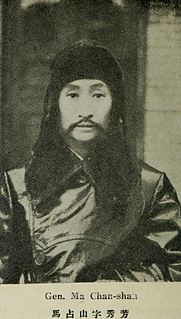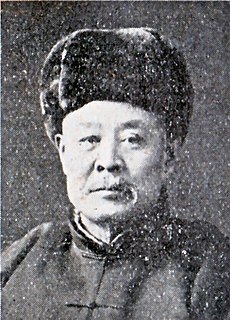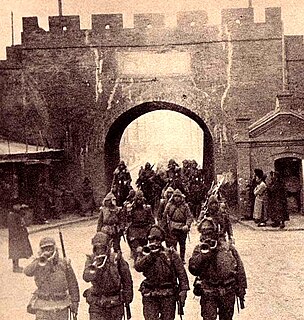
The Wang Jingwei regime is the common name of the Reorganized National Government of the Republic of China, a puppet state of the Empire of Japan, located in eastern China. This should not be confused with the Republic of China under Chiang Kai-shek, which was a separate, non-Japanese-backed government that fought against Japan. It was ruled by a one-party totalitarian dictatorship under Wang Jingwei, an ex-Kuomintang (KMT) official. The region that it would administer was initially seized by Japan throughout the late 1930s with the beginning of the Second Sino-Japanese War. Wang, a rival of Chiang Kai-shek and member of the pro-peace faction of the KMT, defected to the Japanese side and formed a collaborationist government in occupied Nanjing in 1940. The new state claimed the entirety of China during its existence, portraying itself as the legitimate inheritors of the Xinhai Revolution and Sun Yat-sen's legacy as opposed to Chiang Kai-shek's government in Chongqing, but effectively only Japanese-occupied territory was under its direct control. Its international recognition was limited to other members of the Anti-Comintern Pact, which it was a signatory of. The Reorganized National Government existed until the end of World War II and the surrender of Japan in August 1945, at which point the regime was dissolved and many of its leading members were executed for treason.

The Inner Mongolian Army, also sometimes called the Mengjiang National Army, referred to the Inner Mongolian military units in service of Imperial Japan and its puppet state of Mengjiang during the Second Sino-Japanese War, particularly those led by Prince Demchugdongrub. It was primarily a force of cavalry units, which mostly consisted of ethnic Mongols, with some Han Chinese infantry formations.

The Manchukuo Imperial Army was the ground force of the military of the Empire of Manchukuo, a puppet state established by Imperial Japan in Manchuria, a region of northeastern China. The force was primarily used for fighting against Communist and Nationalist guerrillas in Manchukuo but also took part in battle against the Soviet Red Army on several occasions. It initially consisted of former National Revolutionary Army troops of the "Young Marshal" Zhang Xueliang who were recruited after the Japanese invasion of Manchuria en masse, but eventually expanded to include new volunteers and conscripts. The Imperial Army increased in size from about 111,000 troops in 1933 to an estimated strength of between 170,000–220,000 soldiers at its peak in 1945, being composed of Han Chinese, Manchus, Mongols, Koreans, Japanese, and White Russians. Throughout its existence the majority of its troops were considered to be mostly unreliable by their Japanese officers and advisers, due to poor training, equipment, and morale.

The term Collaborationist Chinese Army refers to the military forces of the puppet governments founded by Imperial Japan in mainland China during the Second Sino-Japanese War and World War II. They most notably include the armies of the Provisional (1937–1940), Reformed (1938–1940) and Reorganized National Governments of the Republic of China (1940–1945), which absorbed the former two regimes. Those forces were also commonly known as puppet troops but went under different names during their history depending on the specific unit and allegiance, such as Nanjing Government Army. In total, it was estimated that all pro-Japanese collaborationist Chinese forces combined had a strength of around 683,000.

Ma Zhanshan (Ma Chan-shan; simplified Chinese: 马占山; traditional Chinese: 馬占山; pinyin: Mǎ Zhànshān; Wade–Giles: Ma3 Chan4-shan1; November 30, 1885 – November 29, 1950) was a Chinese general who initially opposed the Imperial Japanese Army in the invasion of Manchuria, briefly defected to Manchukuo, and then rebelled and fought against the Japanese in Manchuria and other parts of China.

The Pacification of Manchukuo was a Japanese anti-insurgency campaign during the Second Sino-Japanese War to suppress any armed resistance to the newly established puppet state of Manchukuo from various anti-Japanese volunteer armies in occupied Manchuria and later the Communist Northeast Anti-Japanese United Army. The operations were carried out by the Imperial Japanese Kwantung Army and the collaborationist forces of the Manchukuo government from March 1932 until 1942, and resulted in a Japanese victory.
Tang Juwu, Tang Chu-wu,唐聚五,(1898–1939), Chinese officer, general of one of the Anti-Japanese Volunteer Armies resisting the pacification of Manchukuo.
After the Japanese invasion of Manchuria, and until 1933, large volunteer armies waged war against Japanese and Manchukuo forces over much of Northeast China.
Feng Zhanhai or Feng Chan-hai, 冯占海,(1899–1963), was one of the leaders of the volunteer armies resisting the Japanese and the puppet state of Manchukuo in Manchuria. Feng was born on November 6, 1899. At eighteen he joined the Dongbei Army, and later entered a military school graduating in 1921. After he graduated, he was successively a platoon leader, company commander, and battalion commander. At the time of the Mukden Incident and invasion of Manchuria he was a colonel commanding a regiment of the Kirin Guards Division.
Wang Fengge was born in Tonghua, Jilin, China. In 1914 Wang Fengge graduated from the Donghua Normal School, and had studied traditional martial arts as a young man. In 1922 he was made a company commander in a brigade of the Northeast Army. In 1926 he retired from the army, going into business, and became involved in the Big Swords Society.
The Northeast Anti-Japanese United Army was the main anti-Japanese guerrilla army in Northeast China (Manchuria) after the Japanese invasion of Manchuria in 1931. Its predecessors were various anti-Japanese volunteer armies organized by locals and the Manchuria branches of the Communist Party of China (CPC). In February 1936, the CPC, in accordance with the instructions of the Communist International, issued The Declaration of the Unified Organization of Northeast Anti-Japanese United Army and marked the official formation of the organization.
The Northeast People's Anti-Japanese Volunteer Army was led by Tang Juwu, formerly the commander of a Northeastern infantry regiment, interned by the Japanese at the beginning of the invasion of Manchuria. It was created by the Northeast National Salvation Society that had appointed Tang as commander following his escape from the Japanese, and helped him link with the local forces which others were organising. Tang also made use of his personal contacts with police chiefs, officials, local gentry militias and the leaders of the Big Swords Society. Tang was able to organize a force which threatened the region to the east of Mukden and communications with Korea.
One of the most successful volunteer armies was the Chinese People's National Salvation Army or NSA, led by a former bandit turned soldier, Wang Delin. At the time of the invasion, Wang Delin's 200 man battalion was stationed near Yanji, a small town in the east of Jilin province. After Wang's troops fired on a party of Japanese surveyors, and Wang refused to submit to the Manchukuo regime, his defiance attracted other resisters to his side. Wang established the NSA on February 8, 1932, numbering over 1,000 men. Within a few months this army became one of the most successful of the volunteer armies. Following news of his victories over Japanese and Manchukuoan forces between February and April, troops who had been reluctant members of the new puppet state's forces deserted and joined the NSA boosting its strength from 4,600 on March 1, to above 10,000 men, possibly as many as 15,000 men, organised in five brigades in April. It is estimated that the NSA had 30,000 volunteers by July 1932.

Zhang Haipeng (1867–1949), was a Chinese Northeastern Army general, who went over to the Japanese during the Invasion of Manchuria and became a general in the Manchukuo Imperial Army of the State of Manchuria.
The Inner Mongolian Campaign in the period from 1933 to 1936 were part of the ongoing invasion of northern China by the Empire of Japan prior to the official start of hostilities in the Second Sino-Japanese War. In 1931, the invasion of Manchuria secured the creation of the puppet state of Manchukuo and in 1933, Operation Nekka detached the province of Jehol from the Republic of China. Blocked from further advance south by the Tanggu Truce, the Imperial Japanese Army turned its attention west, towards the Inner Mongolian provinces of Chahar and Suiyuan, with the goal of establishing a northern China buffer state. In order to avoid overt violation of the Truce, the Japanese government used proxy armies in these campaigns while Chinese resistance was at first only provided by Anti-Japanese resistance movement forces in Chahar. The former included in the Inner Mongolian Army, the Manchukuo Imperial Army, and the Grand Han Righteous Army. Chinese government forces were overtly hostile to the anti-Japanese resistance and resisted Japanese aggression only in Suiyuan in 1936.
Yao Zhenshan (姚振山) was a Chinese soldier and leader of the resistance to the Pacification of Manchukuo.
Li Yanlu, 李延禄, (1895-1985), soldier, communist, and leader of anti-Japanese forces in Manchuria. Li was born in Yenchi, Kirin Province in April 1895. He became involved in the opposition to Yuan Shikai's attempt to restore the monarchy. He joined the Northeastern Army of the Fengtien clique in 1917, as a private soldier and rose to platoon leader then captain over the next sixteen years. Politically he moved to the left and in July 1931 he joined the Communist Party of China. Three months later the Japanese began the Mukden Incident and invasion of Manchuria. Avoiding capture and internment by the Japanese, he joined the volunteer army of Wang Delin. There Communists were welcomed and Li and Zhou Baozhong were made high-ranking officers. Li became the chief of staff of Wang's Chinese People's National Salvation Army one of the most successful of the volunteer armies resisting the Japanese and its puppet state of Manchukuo. He was also said to have been secretly organizing communists within the army. Yet Party policy at the time opposed the volunteer armies and the participation of members in them and had their own Northeastern People's Revolutionary Army. At first the Party severely criticised their conduct yet the stance of the Party prevented the growth of their own forces and did not help the anti-Japanese cause.

Wang Yaowu was a high-ranking KMT general and the Governor of Shandong Province who successfully fought against both the Imperial Japanese Army and the Chinese Communists. In September 1948 Communist forces launched the Battle of Jinan and Wang was captured and held as a prisoner of war until his pardon in 1959. During the Cultural Revolution he came under attack by the Red Guards for being a former nationalist commander and died of a heart attack in 1968.








